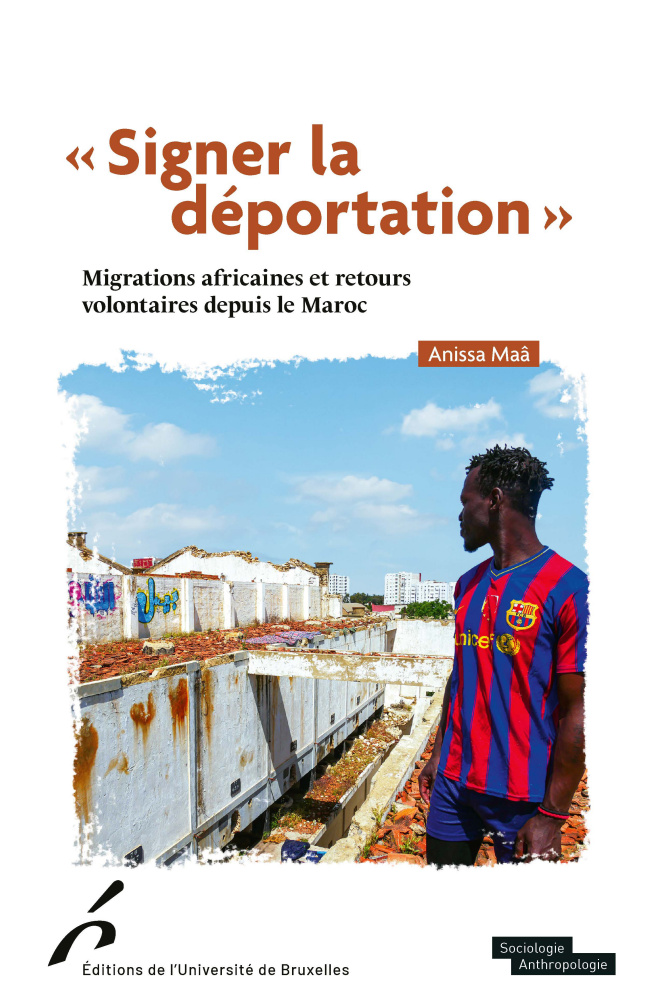« Signer la déportation »
Migrations africaines et retours volontaires depuis le Maroc
First Edition
In Morocco, some African migrants decide to "sign the deportation papers", i.e. to go back home through the assisted voluntary return programmes of the International Organisation for Migration (IOM). Read More
How do migrants decide to go back home through "voluntary" returns? Who encourages them to do so? And how is their removal implemented on the ground? In her book, Anissa Maâ uses sociology and anthropology to examine the assisted voluntary return programmes of the International Organisation for Migration (IOM). Drawing on ethnographic research conducted in Morocco with African migrants and actors assisting them on a daily basis, the author demonstrates that voluntary returns are shaped at the intersection of border violence, local practices of intermediation and the agency of migrants who, in their own words, "sign the deportation". This book reveals the full complexity of an instrument of migration control that is all too often reduced to a disguised form of deportation or promoted as the only possible alternative in a context of border closure.
Specifications
- Publisher
- Éditions de l'Université de Bruxelles
- Author
- Anissa Maâ,
- Collection
- Sociology and Anthropology | n° 20
- ISSN
- 25935895
- Language
- French
- Tags
- humanitarian, International Organization for Migration, IOM, migrants, migration, migration control, Morocco, Sub-Saharan Africa
- Publisher Category
- Publishers own classification > Sociology & Anthropology
- BISAC Subject Heading
- POL048000 POLITICAL SCIENCE / Intergovernmental Organizations > SOC007000 SOCIAL SCIENCE / Emigration & Immigration > SOC066000 SOCIAL SCIENCE / Refugees > POL053000 POLITICAL SCIENCE / World / African
- BIC subject category (UK)
- J Society & social sciences > JH Sociology & anthropology > JHM Anthropology > JHB Sociology
- Dewey (abridged)
- 300-399 Social sciences > 300 Social sciences, sociology & anthropology > 301 Sociology & anthropology
- Onix Audience Codes
- 06 Professional and scholarly
- CLIL (Version 2013-2019)
- 3080 SCIENCES HUMAINES ET SOCIALES, LETTRES > 3091 Migrations et immigrations
- Title First Published
- 25 January 2024
- Type of Work
- Monograph
- Includes
- Bibliography, Appendices, Notes
Paperback
- Product Detail
- 1
- Publication Date
- 25 January 2024
- ISBN-13
- 978-2-8004-1805-6
- Extent
- Total numbered pages : 192
- Code
- 1805
- Dimensions
- 16 x 24 x 11 cm
- Weight
- 382 grams
- ONIX XML
- Version 2.1, Version 3
ePub
- Product Detail
- 1
- Publication Date
- 29 January 2024
- ISBN-13
- 978-2-8004-1806-3
- Product Content
- Text (eye-readable)
- Extent
- Absolute page count : 192
- Code
- 1806
- ONIX XML
- Version 2.1, Version 3
Google Book Preview
Contents
Remerciements
Préface
Introduction
L'éloignement « pour le bénéfice de tous »
Les retours volontaires depuis le Maroc
Cadre d'analyse
Chapitre I – Violence
Violence des frontières
Contingence du retour
Chapitre II – Intermédiation
L'information contre les migrations
Intermédiation humanitaire
Chapitre III – Intermédiation indigène
Des intermédiaires migrants
Racialisation de l'intermédiation
Position ambivalente
Pratiques contrastées
Chapitre IV – Agencéité migrante
Demander le retour
Incertitude du retour
Se retourner
Conclusion

